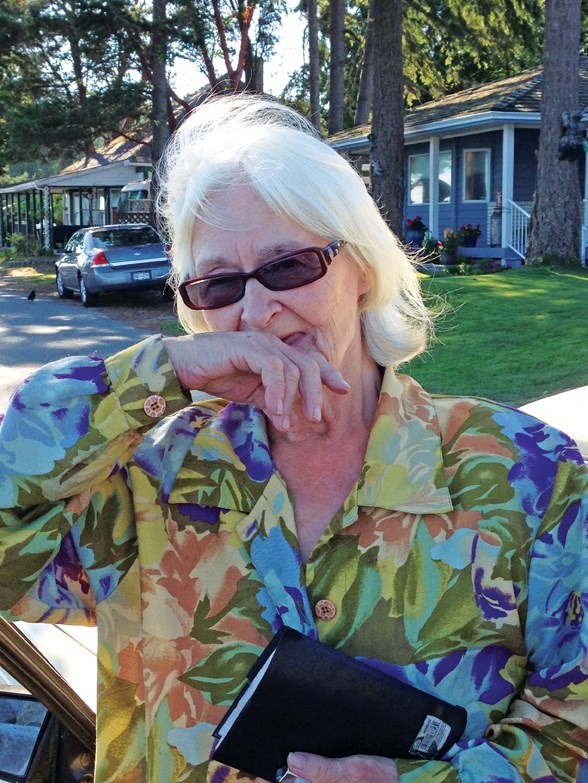Friends of an 82-year-old Sechelt woman who’s been living in her car for the past six months hope that focusing public attention on the situation will lead to the woman getting some help.
Doris Anthonysz said after losing her last home, she couldn’t find suitable rental space on her $1,300/month income.
“There is none, unless I have $800 a month [for rent],” she said. “This has shocked me.”
Anthonysz’s children are living in other parts of the world, and she’s no longer in touch with them.
She said she’s disappointed that the government, and agencies like Vancouver Coastal Health, can’t do more to help people with housing issues.
She thinks, however, the new federal government of Prime Minister Justin Trudeau might take action.
“I have hope in Trudeau. He’s a young man, he has children, he has a good background from his dad,” Anthonysz said.
“I came here to Canada when he [Pierre Trudeau] was Prime Minister. I love this country.”
Powell River Sunshine Coast MLA Nicholas Simons said as soon as his office heard about what was happening, they got in touch with housing minister Rich Coleman, and from there the message got to BC Housing, which has promised to make contact with Anthonysz.
The Sunshine Coast’s homeless outreach worker has also been advised of the case.
Doris Anthonysz’s situation is coming to light at the same time as the Sunshine Coast Homelessness Advisory Council (SCHAC) searches for a bigger space to set up the cold weather shelter this fall.
Advisory Council member Cayce Laviolette said the shelter, which was at St. Hilda’s Anglican Church in Sechelt, saw far more clients in 2015/16 than it had in previous seasons.
“The St. Hilda’s Annex was too small to house all the people who were using it. We were tasked with finding a bigger space,” Laviolette explained. “St. Hilda’s [Anglican] Church has agreed to let us use the space [in 2017/18] if we need to, but everyone agrees that it’s not ideal. We had to turn people away. People were staying in their cars outside the shelter or sleeping outside the shelter because there was no room inside [last season].”
“Only two or three that I’m aware of were able to find housing at the end of the season,” Laviolette said, noting the SCHAC was able to get funding for a part-time outreach worker to try to help other clients find housing before the fall and winter season.
“However, she’s extremely limited in what she’s able to do because there really just isn’t anywhere for anyone to live.”
BC Housing has agreed to provide funding to keep the shelter open every night during the 2016/17 season (which runs from Nov. 1 to March 31), but so far the SCHAC’s search for a bigger space hasn’t turned up anything suitable.
According to Laviolette they need at least 2,000 square feet, two bathrooms, and an area that can be locked for storing client belongings and staff files. It also needs to be on a bus route and, preferably, in Sechelt. And, they need to find it by Oct. 1 in order to have time to get it ready and hire and train staff.
SCHAC is also working with BC Housing to hire an organization to look after running the shelter. Last season it was RainCity Housing from Vancouver. They’re also looking for donations. Laviolette says the biggest need is always cash.
“While donations of sleeping bags and tents are always welcome, financial donations can be made through St. Hilda’s [Anglican] Church,” Laviolette said. “They’re still the registered charity that accepts donations on our behalf.”
If you have a lead on a potential space for a shelter, you can email Laviolette at [email protected]



